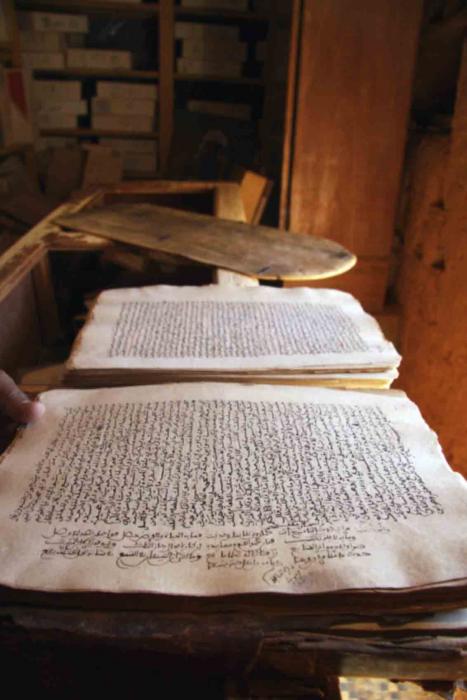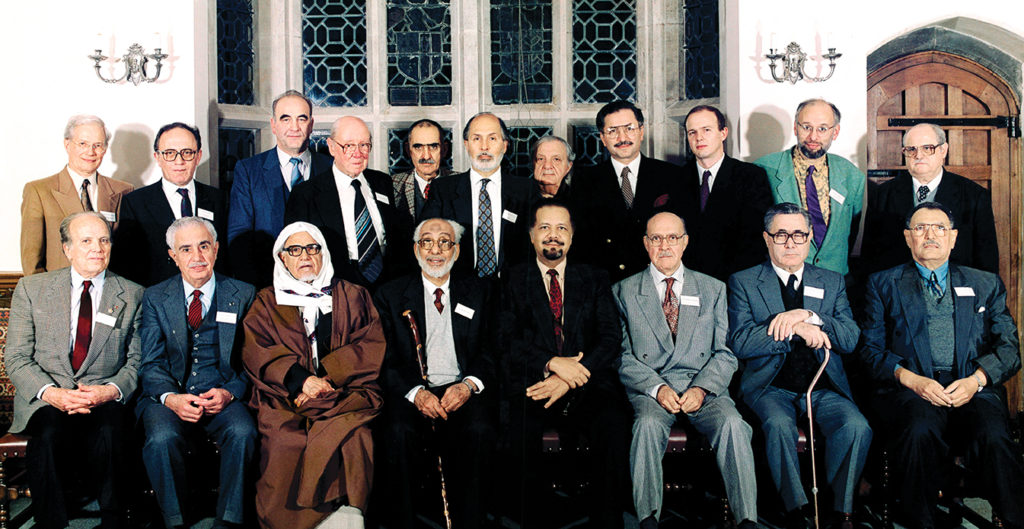About the Manuscript Centre
- Background
- The Manuscript Centre’s Mission
- The Manuscript Centre’s Founding Council
- The Manuscript Centre’s Aims and Objectives
- The Manuscript Centre’s Advisory Board

The Importance of the Islamic Manuscripts
As Islam rapidly spread out of Arabia, bringing into its fold wide areas of Asia and Africa; Islamic civilisation began to flourish, and Arabic became widely spoken throughout the expanding world of Islam.
Advancements were made in almost all aspects of human life. Scholars in all fields received moral and material encouragement, and support from various groups and institutions. Travel for learning was an important part of the scholar's education.
As printing had not been invented yet, books, discourses, and essays had to be written and copied by long hand. An author would dictate his book at his circle of teaching, where scores of students and scholars would be writing down.
Such manuscripts were carefully preserved and handed down from generation to generation.
Works of particular importance were sought after and copied. Works by famous scholars were copied time after time in different areas and generations. There were also professional copiers, many of whom excelled in their art. Thus, there could be many copies of the same book in the same town or city.
Islamic manuscripts constitute a particularly important part of Islamic heritage. During the fourteen centuries of its history, Islamic civilisation has produced a vast number of written works, mostly in Arabic and Persian, but also in Ottoman, Urdu, Bengali, Malay, Swahili and others.
These works number over three million, and cover practically every field of thought, from Qur’anic commentary to jurisprudence, from history to astronomy, from geology to technology, from poetry to rhetoric, etc. They were produced throughout the Islamic world, from western China and the Malay Archipelago, to Andalusia and the Maghreb.
On the other hand, wars, political conflicts, social upheavals, natural disasters, negligence, together with elements of wear and tear and lack of resources, which were both essential for their maintenance and preservation, all led to the disappearance of either whole libraries, or individual manuscripts. For example, at the time of the invasion of Baghdad by the Tatars, who came from Central Asia in the 13th century, hundreds of thousands of manuscripts were deliberately thrown in the Tigris River. Even in the 21st century, the invasion of Baghdad claimed the Awqaf library among its victims, as the library was burnt down.
Despite all these elements, it is estimated that three million Islamic manuscripts survive today.
Islamic manuscripts are to be found not only in every Islamic country and in countries with large Islamic minorities, such as India, the Soviet Union and China, but also throughout Europe and the Americas, as well as in Japan, Australia and some non-Muslim African countries. There are very few countries in the world in which there are not at least some Islamic manuscripts.
These are normally held either in private collections or public libraries. They are always highly valued by their holders. Some private holders may remain unaware of the value of what they have in their collections, yet they are often reluctant or unwilling to share information.
It should be said that manuscripts could range from textbooks to voluminous works by distinguished scholars.
This enormous treasure, the most important intellectual and scholarly heritage in Islam, is – in many areas - in danger of being destroyed through social upheavals, political conflicts, natural causes or simply lack of proper care. It is therefore of the utmost importance that it should be documented as soon as possible, and that every attempt should be made to preserve it for posterity. It is also important that its treasures should be made available to the world.
Al-Furqan Islamic Heritage Foundation (est. 1988) and its Manuscript Centre (est. 1991) were established to achieve this goal, aiming to preserve and study the Islamic written heritage.
The Manuscript Centre’s Mission
The Manuscript Centre's mission is to document and preserve the Islamic written heritage through surveying, imaging, cataloguing, editing and publishing Islamic manuscripts, which constitute a significant part of the Islamic heritage.
The Manuscript Centre’s Founding Council
The Founding Council of the Manuscript Centre was a body of outstanding academics and scholars in the field of Islamic written heritage, such as: history, history of science, sciences, codicology, palaeography and Islamic history. They gathered in London, in December 1991, with the aim to:
- Establish an overall strategy and guidelines.
- Define the Manuscript Centre’s fields of activities.
The Manuscript Centre’s Founding Council consisted of the following members:
- HE Sheikh Ahmed Zaki Yamani, Chairman
- Sheikh Abdel Aziz al-Rifa’i
- Dr Abdel Hadi al-Tazi
- Dr Anton Heinen
- Dr Charles de Fouchécour
- Dr Ekmeleddin Ihsanoğlu
- Dr Enes Karic
- Dr George Atiyeh
- Sheikh Hamad al-Jaser
- Dr Iraj Afshar
- Dr Jan Just Witkam
- Dr Juan Vernet
- Sheikh Mahmoud Shakir
- Dr Nasiruddin al-Asad
- Dr Orhan Bilgin
- Dr Salahuddin al-Munajjid
- Dr Seyyed Hossein Nasr
- Dr Yusuf Ibish
- Dr William Montgomery Watt

The Manuscript Centre's Aims and Objectives
The Manuscript Centre’s main aims and objectives are:
- To initiate, promote and support research into the field of Islamic manuscripts.
- To assist in the preservation and restoration of Islamic manuscripts.
- To raise awareness on the richness and the importance of the Islamic written heritage.
To achieve its aims and objectives, the Centre pursues the following activities:
- Identifying and surveying the existing collections of Islamic manuscripts.
- Assisting in cataloguing previously uncatalogued collections of Islamic manuscripts.
- Editing and publishing Islamic manuscripts of particular significance.
- Organising training courses on various aspects of Islamic written heritage, such as codicology, cataloguing and editing.
- Organising conferences, symposia and lectures to stimulate research and discussions on topics related to the field of manuscripts.
- Establishing a reference library with the main research tools necessary for the study of Islamic manuscripts.
- Developing an online platform/database for online catalogues and other bibliographical works, in order to provide to the scholars, researchers, and students of the Islamic civilisation and heritage, all over the world, easier access to the hidden treasures of the Islamic written heritage.
The Manuscript Centre’s Advisory Board
The Advisory Board of the Manuscript Centre is a body of outstanding academics and scholars in the field of the Islamic written heritage, such as: history, history of science, sciences, codicology, palaeography and Islamic history.
The Advisory Board is an advisory body, with a role to:
- Review the activities of the Manuscript Centre, and provide the appropriate directions.
- Elaborate on, and discuss themes for projects to be adopted by the Centre.
- Inspect projects and scholarly works submitted to the Centre, and issuing decisions as to its acceptance, request for modifications, or rejection.
The Manuscript Centre’s Advisory Board members are:
- Dr Abdullah Yusuf al-Ghonaim
- Dr Ahmed Shawqi Binebine
- Dr Bashar Awwad Marouf
- Dr Ekmeleddin Ihsanoğlu
- Dr Ibrahim Chabbouh
- Dr Konrad Hirschler
- Dr Mohammed Adnan al-Bakheet

